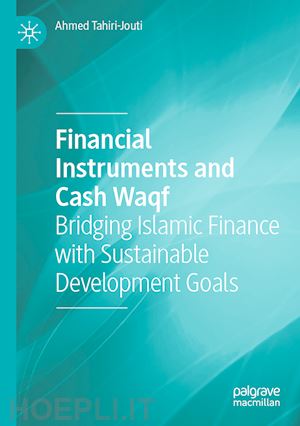
Questo prodotto usufruisce delle SPEDIZIONI GRATIS
selezionando l'opzione Corriere Veloce in fase di ordine.
Pagabile anche con Carta della cultura giovani e del merito, 18App Bonus Cultura e Carta del Docente
The book, organized in three parts, offers a guide to constructing financial instruments based on cash waqf in alignment with the Sustainable Development Goals. The first part discusses the alignment between the Shari'ah economic objectives and the SDGs, the Islamic social finance concept, its instruments and institutions and the intersection between Islamic finance and Islamic social finance. The second part presents a product structure that is based on cash waqf and is targeting the SDGs specifically. Some of these product structures involve zakat collection. The third part of the book presents the methodology to gather all these product structures in a national cash waqf ecosystem that is targeting SDGs. The aim of this ecosystem is to increase the impact of the various initiatives and instruments. In addition to this, the third part of the book presents the concept of Waqf offshore centers and the methodology to conceive and implement them. The aim of these Waqf offshore centersis to connect national cash waqf ecosystems and individuals with investment opportunities bringing more impact. This book will be of interest to academics, researchers, and practitioners of not only Islamic finance but sustainable finance.
Chapter 1. The Shari'ah economic objectives and Sustainable Development Goals.- Chapter 2. The Islamic social finance : from instruments to institutions.- Chapter 3. SDGs : the intersection between Islamic finance and Islamic social finance.- Chapter 4. Cash Waqf investment accounts meeting SDGs.- Chapter 5. Cash Waqf liquid guarantees meeting SDGs.- Chapter 6. Cash Waqf based Microfinance meeting SDGs.- Chapter 7. Takaful funds meeting Cash Waqf requirements and SDGs.- Chapter 8. Islamic social based crowdfunding meeting SDGs.- Chapter 9. Cash Waqf mutual funds meeting SDGs.- Chapter 10. Cash Waqf sukuk meeting SDGs.- Chapter 11. Cash Waqf venture capital meeting SDGs.- Chapter 12. National Cash Waqf ecosystems.- Chapter 13. Waqf Offshore centers and cross border operations.
Ahmed Tahiri-Jouti is the Managing Partner and Founder of Green for South, a specialized firm in consulting in sustainable development, impact finance, fintech and building sustainable financial ecosystems. He is the former Managing Partner and CEO at Al Maali Group (Dubai and Casablanca), a consulting firm specialized in Islamic finance. Dr. Ahmed is an associate editor of the ISRA International Journal of Islamic Finance and has published several papers and book chapters in his fields of expertise. He is also a AAOIFI working groups member to issue new governance standards for the Islamic industry. Dr. Ahmed has conceived a training manual entitled 'Islamic Banking Qualification', which has been granted to more than 1500 people in North Africa, West Africa and Europe since its launch. He is also an international speaker and trainer.











Il sito utilizza cookie ed altri strumenti di tracciamento che raccolgono informazioni dal dispositivo dell’utente. Oltre ai cookie tecnici ed analitici aggregati, strettamente necessari per il funzionamento di questo sito web, previo consenso dell’utente possono essere installati cookie di profilazione e marketing e cookie dei social media. Cliccando su “Accetto tutti i cookie” saranno attivate tutte le categorie di cookie. Per accettare solo deterninate categorie di cookie, cliccare invece su “Impostazioni cookie”. Chiudendo il banner o continuando a navigare saranno installati solo cookie tecnici. Per maggiori dettagli, consultare la Cookie Policy.